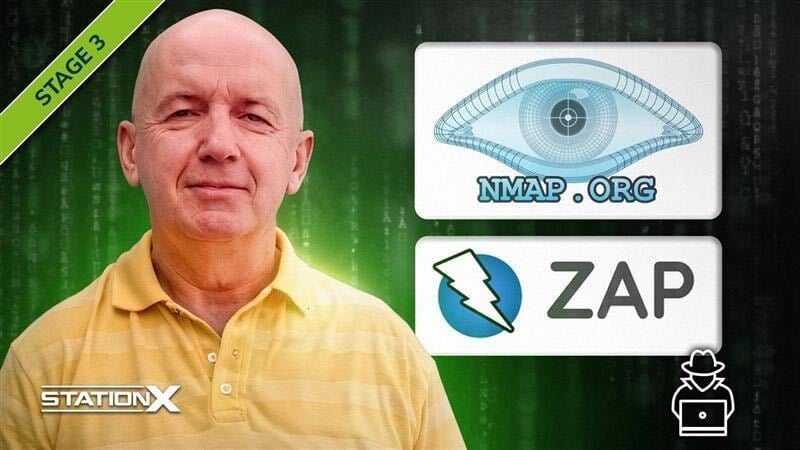How to Learn Hacking Part 1: Beginners Course
Start your ethical hacking journey by building a lab, practicing real attacks, and mastering core techniques. This beginner-friendly course builds essential skills in cyber security, network defense, and system protection - preparing you for certifications like CEH and OSCP and roles in ethical hacking or cyber threat intelligence.

What You’ll Learn
This How to Learn Ethical Hacking Part 1: Beginners Course will teach you:
- Network vulnerability scanning: Discover and assess system weaknesses.
- Linux fundamentals: Navigate and use Linux for ethical hacking.
- Web exploitation: Scan and attack vulnerable web apps using tools like SQLMap.
- Wireless attacks: Deauth and crack Wi-Fi networks with Kali.
- Virtual lab setup: Create Kali Linux and target VMs for practice.
- Entry-level pentesting: Perform basic attacks and analyze results.
- Client-side attacks: Use social engineering to compromise systems.
- Windows exploitation: Dump credentials and perform brute force attacks.
Included in the How to Learn Hacking Course
Suitable for the Following Careers
Course Content
Course Overview
Section: Virtual Lab Build
Section: Troubleshooting VirtualBox
Section: Passive Reconnaissance
Section: Scanning and Enumeration
Section: Scanning for Vulnerabilities Using Nessus
Section: Scanning for Vulnerabilities OpenVAS
Section: Exploiting Microsoft Windows
Section: MSFVENOM
Section: Exploiting Linux
Section: Social Engineering
Section: BASH Scripting for Pentesters
Section: Password Cracking
Section: Pentesting Wireless Networks
Section: Web Based Application Attacks
Section: Browser Exploitation Framework (BeEF)
Section: Remaining Anonymous
Section: CTF Mr Robot
Section: CTF Stapler
Audio Version of Training
OPEN FULL CURRICULUM
Requirements
Description of How to Learn Ethical Hacking Part 1: Beginners Course
Designed for newcomers to cyber security, this hands-on course guides you through the process of becoming an ethical hacker by simulating real-world hacking scenarios in a controlled virtual environment. You'll work with industry-standard tools and gain practical skills from day one.
From scanning and reconnaissance to system exploitation and wireless network attacks, you’ll build confidence using Linux, navigate Windows and web vulnerabilities, and understand the mindset of attackers. The course focuses on learning by doing—with every module reinforcing core concepts through step-by-step labs.
- Build and configure a complete virtual hacking lab
- Use Nmap, Nessus, and OpenVAS to scan for vulnerabilities
- Exploit Windows and Linux systems with tools like MSFVenom and Metasploit
- Crack passwords and harvest credentials using Medusa, Hydra, and Mimikatz
- Launch wireless attacks including deauthentication and PMKID-based exploits
- Execute social engineering and web application attacks
- Maintain anonymity and secure your systems post-attack
Completing this course equips you with the practical aspects of ethical hacking—from setting up a virtual machine lab to exploiting vulnerabilities in a controlled environment. You’ll learn to identify vulnerabilities in a target system, perform attacks like SQL injection, and strengthen your computer networking skills.
This hands-on experience prepares you for further certifications and connects you to the wider cyber security community. All you need is an internet connection and the drive to keep learning.
Who Is This Course For
This course is perfect for beginners who want a practical introduction to ethical hacking using real-world scenarios and hands-on labs. It’s ideal for cyber security students, tech professionals, or anyone looking to explore network security from an attacker’s perspective, gather information like a professional, and stay current with new technologies in the field.
Course Instructor
Prof. K is a seasoned technology expert with a Master of Science in Cyber Security from UMUC (2015) and a Master of Science in Information Technology from Capella University (2007). Since 1998, he has held various roles, including Microsoft Support Technician, Microsoft Certified Trainer, Technology Support Specialist, Senior Network Technology Consultant, IT Auditor, and currently, owner and operator of CLK Technology Solutions in Tucson, Arizona.
His expertise is designing, building, and supporting network infrastructures and security. Prof. K has taught online since 2008 and works with several online universities and colleges.
He holds multiple certifications, including MCTS in Windows Server 2008 Active Directory, Applications Infrastructure, and Network Infrastructure Configuration, as well as A+, Network+, Security+, CompTIA Secure Infrastructure Specialist (CSIS), and CompTIA IT Operations Specialist (CIOS). Prof. K's extensive experience and credentials make him a highly skilled and knowledgeable instructor in the field of technology.
Read More
Read Less
Testimonials

Nisha Y.
What I like most is that the lab videos come with attached resources, which are incredibly helpful—I don’t have to rewatch the entire video to catch the fine details. Thank you so much for creating such a learner-friendly course. It’s perfect for building networking fundamentals, helps beginners gain access to essential tools and concepts, and supports gaining real-world experience like experienced hackers and experienced professionals do in practice.

John A.
Great and simplified content that makes complex cyber security topics easy to understand. The course covers essential skills like vulnerability scanning, post-exploitation, and working with Active Directory, making it ideal for anyone entering the cyber security field. It’s a great way to share knowledge with other hackers, security experts, and those navigating the digital world in monitor mode.

Jesse M.
Good videos that offer a solid foundation in ethical hacking through clear explanations and hands-on labs. The attacks shown are practical and help build practical experience, especially with exercises like capture the flag and scanning for open ports. Great for anyone looking to build a strong foundation and explore real career opportunities in cyber security.
Show More
Show Less
 Prof. K
Prof. K


